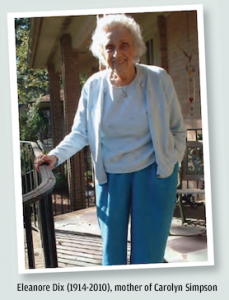Publication: One-to-One, Winter 2010

In the 1890’s, two Swedes named August and Marie, escaping the creeping socialism in their homeland, immigrated to the United States. They traveled separately, for they did not know each other. Neither spoke English, nor did they have money or possessions. They landed at Ellis Island, New York, and soon after, both journeyed to Chicago to settle among the Swedish community there. At a Saturday evening neighborhood party, the two would finally meet. They got married, worked hard, raised six children, and lived what some would call “The American Dream.” Their children, one of which was my grandmother, were part of the generation that would battle back from the Great
Depression and defeat the enemies of WWII. “Those who sow in tears will reap with songs of joy” (Psalm 126:5).
Before my Grandmother’s recent death at age 95, she often spoke passionately about faith, family, hard work, patriotism, getting up after being knocked down … and also “deadbeats.” To hear her explain it, a deadbeat is a certain lowdown individual who holds attributes of laziness or dishonor; a man who wouldn’t provide for his family. Thieves, “dope heads”, and other unsavory characters were also “deadbeats.” Coming from Grandma, the mentioning of a deadbeat would always come with a narrowing of the eyelids and a sharp tone.

THE DARK SIDE
It’s of little debate that we bear the dubious honor of living in the “Age of Entitlement”, a sentiment as sweet as fingernails on a chalkboard. It has been a journey into self-indulgence, self-esteem, coveting, and dibs explored so proficiently that Lewis and Clark would be jealous. Unfortunately, the truths of self-sacrifice and responsibility were denied and so too were their benefits. Thankfully, all ages (this side of eternity) come to pass.
It seems so easy to identify entitlement in operation, doesn’t it? But with little results, we’ve worn out our soap boxes about government programs and its recipients. We’ve now seen the transfer of individual entitlement to government entitlement while other nations such as France and Germany begin to climb out of those ways of thinking. Perhaps the entitlement age has had to come to fruition in order to be exposed; perhaps by God’s mercy, we can press forward in a sustainable manner.
We need to remember individually, however, that the entitlement seed creeps quietly like a serpent and will not disappear so long as its “Chief Proprietor” roams the earth. Entitlement was, after all, Satan’s own tool of demise, which he now wields so skillfully against us, all of us. The entitlement outlook is uncovered when we lay claim and jump over our appointed stewardship. It comes out when we utter such nonsense as “Do you know who I am?” Or “I deserve it! I’m worth it.” It beckons you to compare yourself to others and reveals itself in the voice that tells you, “Hey, you’re better than that guy. If he can have it, so can you.” It corrupts you to believe that if you can take it, you should. It’s so subtle, that without God’s mercy, you don’t detect its roots growing deeper inside of you.
I’ve heard my father-who never forgot the homemade trailer his family lived in as a young boy-say that some are waiting for their ship to come in but they never sent one out. Our carnal nature wants to reap where or how we have not sown. This message is reinforced to us in advertising that appeals to our “deserving” attitude; TV that entices us to envy other people’s lifestyles, and in environments where people compete for status or stuff.
ENTITLEMENT: THE BLOCKING STANCE
Has your employer utilized the ever increasing services of a “Praise Consultant”? No, this has nothing to do with praising God; on the flip side, it’s all about you-employee praise. Whatever happened to earning a paycheck? Imagine placing the modern entitlement gang in the wilderness? Tack on another forty years for “praise breaks!” And the manna better come with a dipping sauce on the side with a low fat option!
The point is that our current entitlement stance is one that blocks our praise to the Father. This happens because we see the blessings in our lives as simply what we are owed; consequently, we miss the opportunity to honor the Lord for what He has done. This chapter of the Entitlement Handbook is entitled “Looking Out for Number 1.” It also instructs us to give back to ourselves through spending time and money on ourselves. This blocks our opportunity to give our tithes, offerings, and benevolence; consequently, it blocks the windows of heaven from opening to us. Perhaps we are in the wilderness with the children of Israel.
OUR FUTURE, THE PROMISED LAND
My two-year-old daughter has a growing but limited vocabulary, yet I’m amazed at how quickly the words “mine” and “I want” were learned and the sub sequent frequency of their use. In considering the culmination of the times we live in, I am reminded that it was the “next generation” that went into the Promised Land after lessons learned in the wilderness by the previous generation. What a disservice we do our children when we teach them from the “Entitlement Handbook” instead of leading them to “the Rock that is higher than I.” Let us focus less on self-esteem, fairness, and rights…and more on sacrifice, restraint, generosity, gratitude, and God’s promises, so that we might not reproduce the narcissism of the day. Rather, may we raise up those who lay up for themselves treasures in Heaven that they might be free of the “yoke of bondage” and heirs to the Kingdom coming.
Lord, make me an instrument of your peace.
Where there is hatred, let me sow love;
Where there is injury, pardon;
Where there is doubt, faith;
Where there is despair, hope;
Where there is darkness, light;
and where there is sadness, joy.
O Divine Master, grant that I may not so much seek to be consoled as to console;
To be understood as to understand;
To be loved as to love.
For it is in giving that we receive;
it is in pardoning that we are pardoned;
and it is in dying that we are born to eternal life. Amen
-Prayer of St. Francis
Scripture Reference: Psalm 126:5
STEPHEN SIMPSON is the Editor of One-to-One Magazine and the Director of CSM Publishing. In addition to publishing ministry, Stephen has served in leadership for churches and ministries in Costa Rica, Florida, Mississippi, Texas, and Michigan, as well as being the Senior Pastor of Covenant Church of Mobile (2004-2013). He continues to travel in ministry across North America and in other nations.